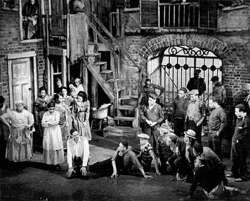“Punting the Pundits” is an Open Thread. It is a selection of editorials and opinions from around the news medium and the internet blogs. The intent is to provide a forum for your reactions and opinions, not just to the opinions presented, but to what ever you find important.
Thanks to ek hornbeck, click on the link and you can access all the past “Punting the Pundits”.
Follow us on Twitter @StarsHollowGzt
Krugman: The Crazies and the Con Man
How will the chaos that the crazies, I mean the Freedom Caucus, have wrought in the House get resolved? I have no idea. But as this column went to press, practically the whole Republican establishment was pleading with Paul Ryan, the chairman of the Ways and Means Committee, to become speaker. He is, everyone says, the only man who can save the day.
What makes Mr. Ryan so special? The answer, basically, is that he’s the best con man they’ve got. His success in hoodwinking the news media and self-proclaimed centrists in general is the basis of his stature within his party. Unfortunately, at least from his point of view, it would be hard to sustain the con game from the speaker’s chair.
New York Times Editorial Board: America’s Aging Voting Machines
In his victory speech after his re-election in 2012, President Obama offered special thanks to those Americans who had stood in long lines to vote – some of whom were still waiting even as he spoke – and then offhandedly added, “by the way, we have to fix that.”
The line got big applause, but now, three years later, much of the country is still far from fixing one major cause of the long lines: outdated voting machines and technologies.
With the 2016 presidential election just a year away, the vast majority of states are still getting by with old machines that are increasingly likely to fail, crash or produce unreliable results. The software in them, mostly from the 1990s, doesn’t have the capabilities or security measures available today.
In the 1980s, as a field French doctor working in Afghanistan, I wrote several articles and open letters to the Soviet Union president to avoid the destruction of the Médecins Sans Frontières Wardak hospital. Of course, the Russian planes bombarded it as an answer.
Targeting a red cross drawn on the roof of a hospital is an unacceptable, cowardly and sadly too-frequent accident. And in Kunduz, last week, a line has again been crossed.[..]
The world demands answers. Who were they targeting and why? Under which military orders? This deliberate killing is not acceptable. What took place is a violation of basic human rights. It was committed against humanitarian and international law, in complete contradiction of the Geneva conventions.
It’s a war crime.
Leo W. Gerard: TPP: Foie Gras for Corporations; Dead Rats for Workers
Some terms of the Trans-Pacific Partnership (TPP), the 12-nation trade proposal completed last week, are so repulsive that the New Zealand trade minister who helped negotiate the scheme described accepting them as swallowing dead rats.
Here’s what New Zealand Minister Tim Groser said: “On the hardest core issues, there are some ugly compromises out there. And when we say ugly, we mean ugly from each perspective – it doesn’t mean ‘I’ve got to swallow a dead rat and you’re swallowing foie gras.’ It means both of us are swallowing dead rats on three or four issues to get this deal across the line.”
There’s no reason for the United States to swallow a trade deal filled with rotten rodent terms. Previous so-called free trade deals have killed American factories and hundreds of thousands of family-supporting manufacturing jobs. Based on that terrible experience, American workers know for sure that if the scheme contains any foie gras, it’ll be served on silver platters to corporations while workers are force-fed rats.
Eric Kasum: Columbus Day? True Legacy: Cruelty and Slavery
Once again, it’s time to celebrate Columbus Day. Yet, the stunning truth is: If Christopher Columbus were alive today, he would be put on trial for crimes against humanity. Columbus’ reign of terror, as documented by noted historians, was so bloody, his legacy so unspeakably cruel, that Columbus makes a modern villain like Saddam Hussein look like a pale codfish.
Question: Why do we honor a man who, if he were alive today, would almost certainly be sitting on Death Row awaiting execution?
If you’d like to know the true story about Christopher Columbus, please read on. But I warn you, it’s not for the faint of heart.
Here’s the basics. On the second Monday in October each year, we celebrate Columbus Day (this year, it’s on October 11th). We teach our school kids a cute little song that goes: “In 1492, Columbus sailed the ocean blue.” It’s an American tradition, as American as pizza pie. Or is it? Surprisingly, the true story of Christopher Columbus has very little in common with the myth we all learned in school.
Zach Stafford: Respectability politics won’t save the lives of black Americans
In the wake of Michael Brown, many black Americas still secretly believed and clung to the idea that respectability politics, or the idea that if we ‘act right’ we will be just fine, were actually a viable way to stay alive. In the past few years, we have been reminded that being respectable will not save our lives. [..]
The reason why being ‘respectable’ doesn’t work is because no matter how respectable you may be acting, your performance isn’t undoing the very real systematic ways in which our world operates.
Wearing a tie doesn’t rectify the fact that black people are incarcerated at six times that rate of white people. You having the ‘right job’ doesn’t give a black person a job as the community faces an unemployment rate of twice that of white people. And saying #AllLivesMatters doesn’t take the bullet out of the literally countless black bodies shot dead by police officers.
Instead, believing that our lives only matter when we ‘act right’ only fuels the very dangerous ways in which our world operates. It protects the structural racism that no one ever wants to talk about or challenge. And it inevitably makes you believe that your life depends on a well enunciated “yes, sir.”


 The Bavarian royalty invited the citizens of Munich to attend the festivities, held on the fields in front of the city gates. These famous public fields were named Theresienwiese-“Therese’s fields”-in honor of the crown princess; although locals have since abbreviated the name simply to the “Wies’n.” Horse races in the presence of the royal family concluded the popular event, celebrated in varying forms all across Bavaria.
The Bavarian royalty invited the citizens of Munich to attend the festivities, held on the fields in front of the city gates. These famous public fields were named Theresienwiese-“Therese’s fields”-in honor of the crown princess; although locals have since abbreviated the name simply to the “Wies’n.” Horse races in the presence of the royal family concluded the popular event, celebrated in varying forms all across Bavaria. The Mary Rose was a carrack-type warship of the English Tudor navy of King Henry VIII. After serving for 33 years in several wars against France, Scotland, and Brittany and after being substantially rebuilt in 1536, she saw her last action on 19 July 1545. While leading the attack on the galleys of a French invasion fleet, she sank in the Solent, the straits north of the Isle of Wight. The wreck of the Mary Rose was rediscovered in 1971 and salvaged in 1982 by the Mary Rose Trust in one of the most complex and expensive projects in the history of maritime archaeology. The surviving section of the ship and thousands of recovered artefacts are of immeasurable value as a Tudor-era time capsule.
The Mary Rose was a carrack-type warship of the English Tudor navy of King Henry VIII. After serving for 33 years in several wars against France, Scotland, and Brittany and after being substantially rebuilt in 1536, she saw her last action on 19 July 1545. While leading the attack on the galleys of a French invasion fleet, she sank in the Solent, the straits north of the Isle of Wight. The wreck of the Mary Rose was rediscovered in 1971 and salvaged in 1982 by the Mary Rose Trust in one of the most complex and expensive projects in the history of maritime archaeology. The surviving section of the ship and thousands of recovered artefacts are of immeasurable value as a Tudor-era time capsule. Welcome to the Stars Hollow Gazette‘s
Welcome to the Stars Hollow Gazette‘s 
Recent Comments